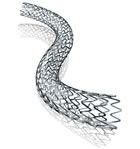|
FDA Approves First Drug-Eluting Stent
for Use During Heart Attacks
Boston Scientific's ION™ and TAXUS® Liberte® Paclitaxel-Eluting Stent Systems now approved in the U.S. for treating patients with acute myocardial infarction
|
 |

ION™ Paclitaxel-Eluting
Platinum Chromium Stent |
March 1, 2012 -- Since the pioneering work done by Drs. Geoffrey Hartzler, William O'Neill and others, angioplasty has been considered the gold standard for the treatment of heart attacks. While there may be controversy about stent use in stable patients, there is no question that lives can be saved and heart damage prevented by quickly opening up an artery that has suddenly become blocked and is causing an infarction. A majority of hospitals in the U.S. that have catheterization labs (where angioplasty is performed) have now been able to achieve "door-to-balloon" times under 90 minutes, so the chances for stopping a heart attack in its tracks are very good for patients who are able to get to such a hospital soon after heart attack symptoms occur.
Should Drug-Eluting Stents Be Used During Acute MI?
What has not been clear is whether a stent and, if so, what kind of stent should be used in combination with a balloon to keep the artery open. Bare metal stents are routinely used, but questions about drug-eluting stents (DES) have been raised due to safety concerns over increased risk of stent thrombosis in the first generation DES. Since a patient having a heart attack is already in a heightened state of platelet reactivity and is thrombogenic (more prone to blood clots) cardiologists have been cautious about using drug-eluting stents to prop open the infarct-related artery. Most of the safety concerns revolved around the polymer used to coat the metal stent, and whether that plastic increased inflammation and platelet aggregation, resulting in a blood clot that often caused another heart attack.
But a new generation of drug-eluting stents has emerged in the past couple of years, with thinner struts, thinner coatings and more biocompatible polymers. However, treating a patient who is having a heart attack has still been an "off label" use for drug-eluting stents. Until last week....
FDA Approves Two Second Generation Drug-Eluting Stents Using Data from HORIZONS-AMI
On February 22, 2012, the U.S. FDA formally approved the ION™ Paclitaxel-Eluting Platinum Chromium Coronary Stent System and TAXUS® Liberte® Paclitaxel-Eluting Coronary Stent System for use in patients experiencing an acute myocardial infarction (AMI), or heart attack. Both are manufactured by Boston Scientific Corporation (NYSE: BSX) and they currently are the only drug-eluting stent (DES) systems in the U.S. with an approved indication to treat patients with AMI.
Approval of this new indication is a result of FDA's review of data from the Paclitaxel (TAXUS) clinical program and HORIZONS-AMI trial. In the global HORIZONS-AMI trial, 3,006 patients were randomized to receive either drug-eluting stents or bare-metal stents for the treatment of AMI, making it the largest randomized trial to study coronary stents in heart attack patients.
In a press release, Dr. Keith D. Dawkins, Global Chief Medical Officer for Boston Scientific, stated:
"Clinical data from the HORIZONS-AMI trial showed that, in patients with AMI, paclitaxel-eluting stents were superior in efficacy to bare-metal stents, significantly reducing clinical and angiographic restenosis compared to bare-metal stents, while demonstrating a comparable safety profile at three years. We are proud that our investments in randomized trials such as HORIZONS-AMI have led to the approval of products to treat a broader range of patients with coronary artery disease."
The TAXUS Liberte stent has actually been around for several years. The ION is newer, approved just a year ago for use in the U.S. Although recently concerns were raised over the ION and Promus Element stent platforms regarding the issue of longitudinal stent compression ("New Boston Scientific Stent Shows Significant Shortening Compared to Other 2nd Generation DES") this seems to be a relatively rare event that can be avoided by taking certain precautions ("Avoiding and Repairing Coronary Stent Distortion"). And while there are other drug-eluting stents available in the U.S. that have shown equivalent or even better results across-the-board, for example Abbott's Xience and Medtronic's Resolute, only Boston Scientific ran a specific trial to test their stents in acute MI cases (the HORIZON-AMI trial) and therefore the FDA approved this new indication for their stents only, making it "on label."
Saving Lives By Stopping Heart Attacks is a Patient Education Challenge
Currently the American Heart Association estimates that death by heart attack accounts for one out of every six deaths annually in the U.S. There are more than 1.2 million new and recurrent cases of heart attack each year, with approximately 34 percent resulting in death.
Since the technology now exists to stop a heart attack in its tracks, and since the majority of angioplasty-practicing hospitals are equipped with systems to get heart attack victims into the cath lab and revascularized within 90 minutes of presenting in the Emergency Department, it remains a patient education challenge to help people become aware of the symptoms of a heart attack and to urge them to call 911, so that they arrive at the hospital as soon as possible.
For more information, read our article, "Surviving Heart Attack: Get Me To The Door On Time!"
Reported by Burt Cohen, March 1, 2012
|


